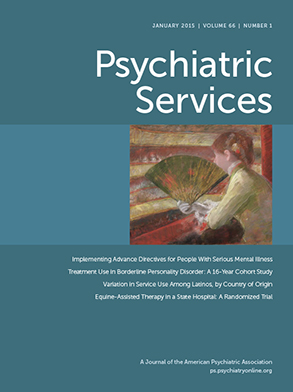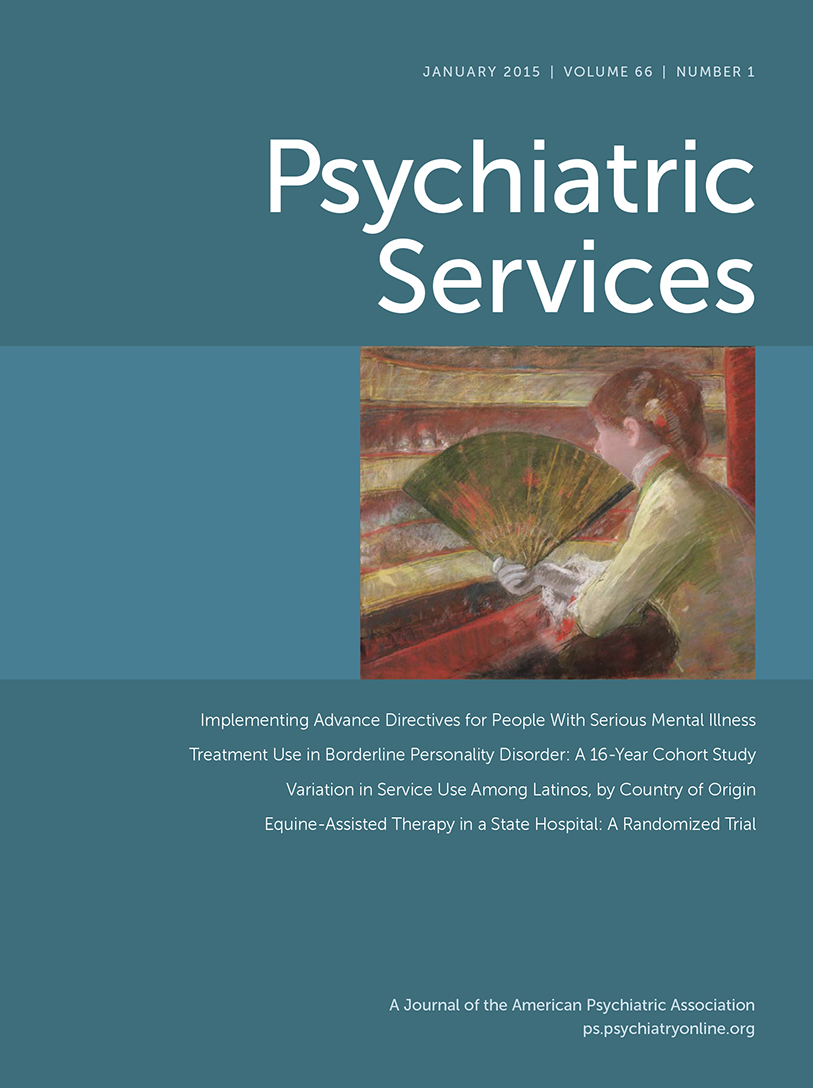Mental disorders are the leading cause of disability in the United States (
1). In 2011 it was estimated that one in five U.S. adults had a mental illness and that less than 40% had received mental health services (
1). In that year, a total of 10.8 million adults reported an unmet need for mental health care (
2). Inadequate treatment contributes to individual and family suffering, spillover costs to the prison system, homelessness, lost productivity, and suicide.
Unfortunately, obtaining mental health services can be difficult, even with insurance. Surveys of psychiatrists have shown that although most were accepting new patients, psychiatrists were more likely to accept self-pay and privately insured patients than publicly insured patients (
3–
5). Although these studies are valuable, they do not reflect patients’ experience of seeking outpatient care.
Two studies have attempted to replicate the patient experience by calling psychiatric clinics to schedule outpatient appointments (
5,
6). They found that appointments were difficult to obtain and that clinics often did not answer or return the calls. Using a similar “simulated patient” methodology, we posed as care seekers with three payer types: Blue Cross Blue Shield (BCBS) PPO, Medicare, and self-pay. In a departure from past studies, we called individual psychiatrists, rather than psychiatric clinics, in three major U.S. cities.
Methods
We utilized the BCBS Web site to obtain a list of in-network BCBS providers in Chicago, Houston, and Boston. We selected suburban zip codes for our search so that our calls would not all go to a single medical center, and we chose BCBS because it is the largest insurer in Illinois, Texas, and Massachusetts.
We randomly divided the first 120 psychiatrists listed in each city (N=360) into three payer groups of 40 each. Each psychiatrist was called one time by a simulated patient claiming to have one of the three coverage types: BCBS PPO, Medicare, or self-pay. We posed as patients with depressive symptoms and made calls during normal business hours. Voicemails specifying payer type were left, if possible, when calls were not answered.
Data collected included whether the call was answered, whether we were able to make an appointment, the soonest available appointment date, the reason why no appointment was given, and if and when calls were returned. If appointment availability was not confirmed within two weeks, we called again and collected the same data. Data analysis was performed with R statistical programming software.
The Cambridge Health Alliance Institutional Review Board approved our study.
Results
We called 360 psychiatrists in round 1. Forty percent of calls were answered. However, 16% of the numbers in the BCBS database were wrong; they included numbers for a McDonald’s restaurant, a boutique, and a jewelry store. Therefore, although 40% of the calls to the 360 psychiatrists were answered, we were able to reach only 119 psychiatrists in our sample in the first calling round (33%). As expected, there were no significant differences by payer with regard to answered calls; however, significant differences in answered calls were noted between cities. Psychiatrists in Houston were most likely to answer round 1 calls, and psychiatrists in Boston were least likely (Boston, 31%; Houston, 50%; and Chicago, 39%; χ2= 9.24, df=2, p=.01).
Of the 216 unanswered calls in round 1, 78 (36%) were returned. Psychiatrists in Boston were significantly more likely than psychiatrists in Houston to return calls (Boston, 50%; Houston, 15%; and Chicago, 42%; χ2=19.80, df=2, p<.001). A possible explanation is that more psychiatrists in Houston than in Boston answered our initial calls. Although the proportion of round 1 calls returned was larger in the BCBS and self-pay groups than in the Medicare group, this difference was not significant.
In round 2, we attempted to reach the 222 psychiatrists for whom we did not have appointment availability information after round 1. In this round, 75 calls (34%) were answered. Again, some numbers were wrong, and we were able to speak to someone at the correct number for only 62 (28%) of these calls. Of the 123 unanswered round 2 calls, 42 (34%) were returned. There were no significant differences in returned round 2 calls between cities or payers. After two rounds of calling, we were able to obtain appointment availability information for 219 of 360 psychiatrists. No further attempts were made to reach the remaining psychiatrists.
In total, we were able to obtain appointments with 93 psychiatrists, representing 26% of our sample.
Tables 1 and
2 list reasons the offices gave for not making appointment by payer type and city, respectively. Although we were able to obtain appointments more frequently by using BCBS or self-pay compared with Medicare, this difference was not significant. There was a significant difference in success rate between cities, with psychiatrists in Boston least likely to offer an appointment and those in Houston most likely (Boston, 18%; Houston, 34%; and Chicago, 25%; χ
2=7.92, df=2, p=.02). The mean±SD number of days until the first available appointment was 25±22 (range 0–93 days), and this did not differ significantly across city or payment type.
Discussion and Conclusions
Obtaining an outpatient appointment with a psychiatrist was difficult in the three cities we surveyed, and the appointments given were an average of one month away. Our findings add to the growing evidence that the mental health system is difficult for consumers to access. The findings are in line with national data demonstrating that two-thirds of primary care physicians cannot obtain outpatient mental health services for patients who need them (
7).
Of note, the BCBS database did not exclusively list psychiatrists who were reachable and accepting patients: 16% of the numbers listed were wrong, 15% of practices were full (accepting no new patients), and 10% of the numbers directed us to psychiatrists who did not see general adult outpatients. There was also a high incidence of unanswered calls, which supports existing research showing that this phenomenon is more common when individuals seek mental health care compared with other forms of care (
5). In addition, our study was limited both by its small sample and because we called only psychiatrists and not other kinds of mental health providers. We did this to mimic inexperienced care seekers who might use our process of searching for psychiatrists on an insurance Web site rather than obtaining the name of a specific provider.
Our results indicate that having insurance is not enough to guarantee access to outpatient care from a psychiatrist. In fact, although we would have expected BCBS PPO to perform better because we used BCBS’s list of in-network providers, insurance did not offer any significant benefit over paying out of pocket in our attempts to obtain outpatient appointments with psychiatrists. Although the per capita supply of active physicians is highest in Massachusetts and ninth lowest in Texas among the states, it was most difficult to reach psychiatrists and obtain appointments in Boston and least difficult in Houston (
8). The difference may therefore be related to the size of the insured population or to demand: in 392 urbanized areas ranked by highest uninsured rates in 2011, Houston ranked 11, whereas Boston ranked 299 (
9). Expanding health insurance coverage through the Affordable Care Act may thus do little to change the conditions that made it difficult for us to obtain outpatient appointments with psychiatrists—or worse, expansion of coverage might further overwhelm the capacity of available services from these providers.
Increasing the number of medical students who choose to go into psychiatry would likely improve matters. This might be achieved through several means. First, integrating psychiatry more into general medical care through a longitudinal exposure to the field—as opposed to the traditional month-long clerkships—appears to reduce some of the stigma traditionally attached to psychiatric care and has also been demonstrated to greatly increase the number of medical students who choose psychiatry (
10). In addition, exposing medical students to psychodynamic psychotherapy is associated with dramatic increases in the number of students who select psychiatry (
10,
11).
Beyond changing the psychiatric training that medical students receive, increasing reimbursement rates for care provided by psychiatrists may attract more medical students to the profession and cause more psychiatrists in private practice to accept new patients who are insured. Meanwhile, insurance companies must ensure that the information for their in-network providers is accurate and useful for patients seeking care.
Acknowledgments
The authors report no financial relationships with commercial interests.

